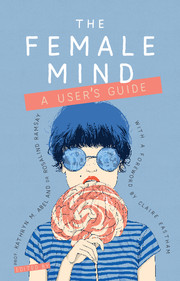Book contents
- Frontmatter
- Acknowledgements
- Contents
- Foreword
- Introduction: being female
- Part I Women in perspective
- Part II Women and society
- Part III Women and their environment
- Part IV Women and specific disorders
- 18 Depression and other mood disorders
- 19 Anxiety disorders
- 20 Trauma and post-traumatic stress disorder
- 21 The dangers of rumination
- 22 Obsessive–compulsive disorder
- 23 Eating disorders and body dysmorphic disorder
- 24 Psychosexual disorders
- 25 Personality disorders: risks and recovery
- 26 Self-harm
- 27 Women and addiction
- 28 Autism spectrum disorder
- 29 Attention-deficit hyperactivity disorder
- 30 Psychotic illness
- 31 Postnatal depression and postpartum psychosis
- 32 Living longer: normal age-related changes, dementia and depression
- Part V Women and treatment
- Contributors
- Index
20 - Trauma and post-traumatic stress disorder
from Part IV - Women and specific disorders
Published online by Cambridge University Press: 02 January 2018
- Frontmatter
- Acknowledgements
- Contents
- Foreword
- Introduction: being female
- Part I Women in perspective
- Part II Women and society
- Part III Women and their environment
- Part IV Women and specific disorders
- 18 Depression and other mood disorders
- 19 Anxiety disorders
- 20 Trauma and post-traumatic stress disorder
- 21 The dangers of rumination
- 22 Obsessive–compulsive disorder
- 23 Eating disorders and body dysmorphic disorder
- 24 Psychosexual disorders
- 25 Personality disorders: risks and recovery
- 26 Self-harm
- 27 Women and addiction
- 28 Autism spectrum disorder
- 29 Attention-deficit hyperactivity disorder
- 30 Psychotic illness
- 31 Postnatal depression and postpartum psychosis
- 32 Living longer: normal age-related changes, dementia and depression
- Part V Women and treatment
- Contributors
- Index
Summary
Razia's story
Razia, a shy and frightened Somalian woman, came to my clinic complaining of headaches. Since an operation several months before, her problems had got worse. Since the birth of her 7-year-old boy, Razia had been unable to sit down for any length of time owing to marked discomfort in the pelvic floor area. With little understanding of Razia's difficulties, her gynaecologist had tried to address her severe discomfort by operating on an episiotomy scar.
A female interpreter was present during the interview, but Razia refused to allow her husband in the room. She informed us of the following: she had fled her home country with her husband and her two children 10 years ago owing to the war situation. A week before her departure, she had been gang-raped in front of her children: her 3-year-old daughter was held by one of the soldiers in front of her while the rape took place; the 18-month-old toddler was around crying. She never told her husband, who at the time was serving on the front line. ‘We were alive’, she said. ‘I washed myself and carried on as if it hadn't happened. If I had told him, he would be obliged to take revenge and he could be killed.’
After a dangerous journey, they got to the UK. Social Services and other people helped them. They obtained refugee status after an amnesty. Razia became pregnant and, after the birth of her second son, she developed severe symptoms of anxiety – nightmares, flashbacks and panic attacks. In addition, she became unable to sit down as this would trigger flashbacks and intrusive thoughts of the rape. She underwent trauma therapy, but did not respond to treatment. She spent the next 7 years in bed, more and more disabled by her symptoms and unable to look after her family; her husband became the main carer.
Razia understood some English but her ability to concentrate was poor and her fears made it impossible for her to go to classes, or relate to her neighbours or people from her country. She was determined to get better, as ‘My children need me’, but did not know how to go ahead. She was almost illiterate, having had limited access to education while growing up. Her husband was better educated and owned his own land and livestock.
- Type
- Chapter
- Information
- The Female MindUser's Guide, pp. 128 - 134Publisher: Royal College of PsychiatristsPrint publication year: 2017

